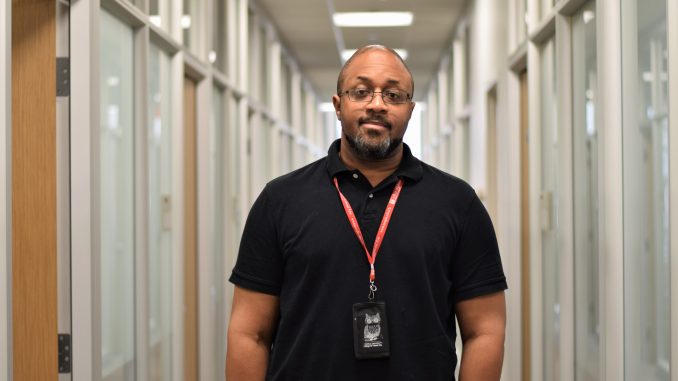
Darvin Martin was in fifth grade when a classmate approached him in art class and asked, “Hey, do you want to play Dungeons & Dragons?”
Soon after, he used his allowance money to buy what he said role-players know as “the Red Box” — a Dungeons & Dragons starter set sold during the early 1980s.
Now Martin, a professional development adviser in the College of Liberal Arts, has a contract with The Design Mechanism, a role-playing game publishing company based in Canada.
His first module, “Xamoxis’ Cleansing,” is an expansion to an existing role-playing game called Mythras and was published in December. He wrote the module for four to six players.
Martin is working on a second module, “These Violent Delights,” to be released later this year. He said the publishers also contracted him to write a fantasy book about Persian mythology.
Martin started working with the company after he played Mythras — then called RuneQuest — and liked the game so much that he decided to reach out to the publisher.
“I emailed the publisher and I said, ‘Hey I really like your product, I just want you guys to know you have a really great product here.’ … And then they emailed back and said ‘Hey, would you be interested in writing for us?’” Martin said. “It was really just asking.”
“I’ve always written fantasies, like short stories, novels, that kind of stuff,” he added. “I had never written for a big publisher, though.”
Martin said writing modules is different than writing short stories because modules require more “exploded details.” Modules provide the basic setting of a story within a role-playing game, but players can spend hours — or even days — using their imaginations and expanding on the story.
He said he has to keep in mind that a gamemaster — or a narrator for a role-playing game — will be reading the module aloud during gameplay, so he has to include specific details like types of plants in a forest or fictional holidays.
“My wife was playing for a while, but she got bored because our battles would last for like three hours,” he said. “She’d rather play Xbox.”
Jared Pryor, a former research assistant at the Temple University Collaborative on Community Inclusion of Individuals with Psychiatric Disabilities, said he met Martin in 2011 when they used to take the bus to work together. Martin approached Pryor after he noticed he was reading a “Star Wars” novel, and “that led to other nerdy things,” Pryor said.
Martin invited Pryor to play Dungeons & Dragons soon after they met. Pryor said they still play role-playing games together about once per week over Google Hangouts or Roll20, an online platform for role-playing games.
Martin said he enjoys role-playing games because they give the players “absolute freedom.”
“In a video game, sure you have the graphics and stuff in front of you, but there’s only so much you can do,” he said. “You can’t just say, ‘Hey, you know what? I think I just wanna chill on this rock and like, cook some food and sharpen my sword for a while.’”
“Whereas a role-playing game you can do anything within the bonds of the world that you’re in,” he added.
Martin said role-playing games are also a good way to build critical thinking skills and “explore complicated issues,” like power, race and gender.
He is currently working on his own role-playing game, “Guardian of Valoria,” aimed toward children ages 9 through 13. The game is set in an alien world and revolves around a struggle between good and evil, he said. He hopes to start a GoFundMe page by the end of the year so he can play the game with at-risk youth “to help them develop things like confidence, creativity and critical thinking skills.”
“It’s an escape, number one,” Martin said. “It engages your critical thinking, like you have to think, think, think your way through. … And I think it definitely has therapeutic applications.”
Erin Moran can be reached at erin.moran@temple.edu or on Twitter @ernmrntweets.


Be the first to comment